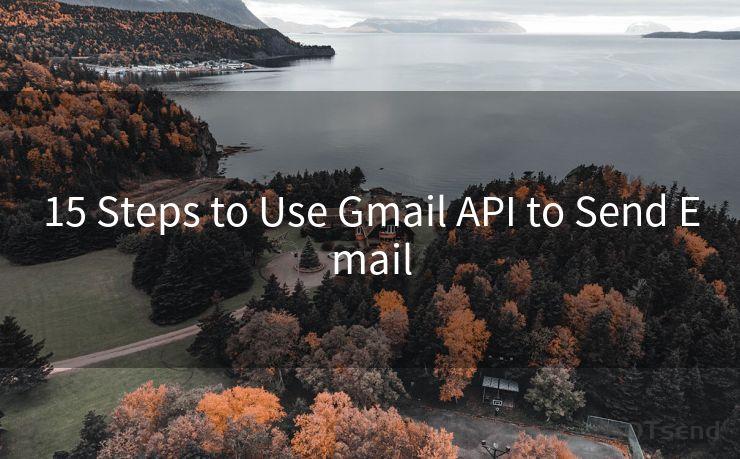15 Steps to Use Gmail API to Send Email




When it comes to sending emails programmatically, the Gmail API offers a robust and flexible solution. In this article, we'll outline the 15 steps you need to follow to successfully use the Gmail API for sending emails. Let's dive into the process!
Step 1: Understand the Gmail API
Before you begin, it's essential to have a basic understanding of the Gmail API and its capabilities. The Gmail API allows you to interact with Gmail to send, receive, and modify emails.
Step 2: Set Up a Google Cloud Platform Project
To use the Gmail API, you need to set up a project on the Google Cloud Platform. This involves creating a new project and enabling the Gmail API for it.
Step 3: Generate API Credentials
Once your project is set up, you'll need to generate API credentials. These credentials will authenticate your application and allow it to access the Gmail API.
Step 4: Install the Necessary Libraries
You'll need to install the appropriate libraries for your programming language to interact with the Gmail API. For example, if you're using Python, you might install the google-api-python-client library.
Step 5: Authorize Your Application
Using the credentials you generated, you must authorize your application to access a user's Gmail account. This typically involves redirecting the user to a Google sign-in page and handling the authorization code returned.
Step 6: Create a Gmail Service Object
With the authorization in place, you can now create a Gmail service object. This object will be used to make requests to the Gmail API.
Step 7: Prepare the Email Content
Before sending an email, you need to prepare the email content. This includes the subject, body, and any attachments you want to include.
Step 8: Create a Message Object
Using the Gmail API, you'll need to create a message object. This object represents the email you want to send and contains all the necessary information.
Step 9: Encode the Message
The message needs to be encoded in Base64 format before it can be sent via the API. This ensures that the message content is properly formatted for transmission.
Step 10: Send the Email
With the message object prepared and encoded, you can now use the Gmail API's messages.send method to send the email.
Step 11: Handle Responses
After sending the email, you should handle the API's response. This includes checking for any errors and confirming that the email was sent successfully.
Step 12: Error Handling
It's essential to implement proper error handling in your code. This helps you identify and troubleshoot any issues that may arise during the email sending process.
Step 13: Test Your Implementation

Before deploying your code, make sure to test it thoroughly. Send test emails to different recipients and check if they arrive as expected.
Step 14: Monitor and Troubleshoot
Regularly monitor your email sending process and troubleshoot any issues that may occur. The Gmail API provides detailed error messages that can help you diagnose problems.
Step 15: Optimize and Scale
As your email sending needs grow, you may need to optimize and scale your implementation. Consider using batch processing, caching, and other techniques to improve performance.
By following these 15 steps, you can successfully use the Gmail API to send emails from your application. Remember to keep your code up to date with any changes in the Gmail API and Google Cloud Platform to ensure smooth operations.
In conclusion, mastering the Gmail API allows you to automate and customize your email communications effectively. By following the steps outlined in this article, you can integrate email functionality into your applications and services, enhancing your ability to reach and engage with your audience.




🔔🔔🔔
【AOTsend Email API】:AOTsend is a Managed Email Service for sending transactional emails. Support Email Types: reminders, authentication, confirmations, notifications, verification codes, invoices, password resets, account activations, billing statements, two-factor authentication (2FA), and one-time passwords (OTP) emails, etc. $0.28 per 1000 Emails. 99% Delivery, 98% Inbox Rate.
You might be interested in:
Why did we start the AOTsend project, Brand Story?
What is a Managed Email API, How it Works?
Best 25+ Email Marketing Platforms (Authority,Keywords&Traffic Comparison)
Best 24+ Email Marketing Service (Price, Pros&Cons Comparison)
Email APIs vs SMTP: How they Works, Any Difference?
Scan the QR code to access on your mobile device.
Copyright notice: This article is published by AotSend. Reproduction requires attribution.
Article Link:https://www.mailwot.com/p1945.html



